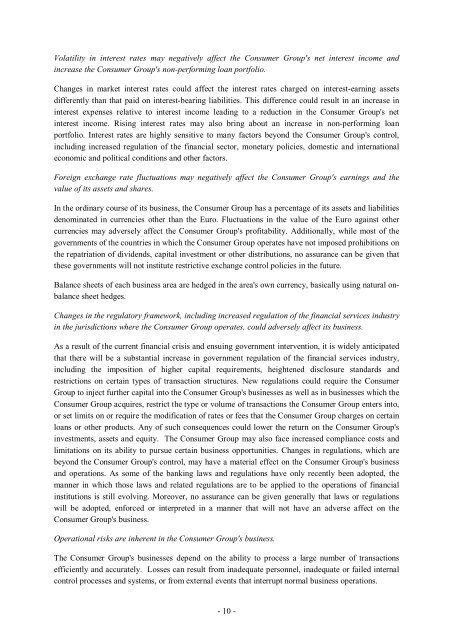INFORMATION MEMORANDUM DATED 9 JULY 2009 ...
INFORMATION MEMORANDUM DATED 9 JULY 2009 ...
INFORMATION MEMORANDUM DATED 9 JULY 2009 ...
Create successful ePaper yourself
Turn your PDF publications into a flip-book with our unique Google optimized e-Paper software.
Volatility in interest rates may negatively affect the Consumer Group's net interest income and<br />
increase the Consumer Group's non-performing loan portfolio.<br />
Changes in market interest rates could affect the interest rates charged on interest-earning assets<br />
differently than that paid on interest-bearing liabilities. This difference could result in an increase in<br />
interest expenses relative to interest income leading to a reduction in the Consumer Group's net<br />
interest income. Rising interest rates may also bring about an increase in non-performing loan<br />
portfolio. Interest rates are highly sensitive to many factors beyond the Consumer Group's control,<br />
including increased regulation of the financial sector, monetary policies, domestic and international<br />
economic and political conditions and other factors.<br />
Foreign exchange rate fluctuations may negatively affect the Consumer Group's earnings and the<br />
value of its assets and shares.<br />
In the ordinary course of its business, the Consumer Group has a percentage of its assets and liabilities<br />
denominated in currencies other than the Euro. Fluctuations in the value of the Euro against other<br />
currencies may adversely affect the Consumer Group's profitability. Additionally, while most of the<br />
governments of the countries in which the Consumer Group operates have not imposed prohibitions on<br />
the repatriation of dividends, capital investment or other distributions, no assurance can be given that<br />
these governments will not institute restrictive exchange control policies in the future.<br />
Balance sheets of each business area are hedged in the area's own currency, basically using natural onbalance<br />
sheet hedges.<br />
Changes in the regulatory framework, including increased regulation of the financial services industry<br />
in the jurisdictions where the Consumer Group operates, could adversely affect its business.<br />
As a result of the current financial crisis and ensuing government intervention, it is widely anticipated<br />
that there will be a substantial increase in government regulation of the financial services industry,<br />
including the imposition of higher capital requirements, heightened disclosure standards and<br />
restrictions on certain types of transaction structures. New regulations could require the Consumer<br />
Group to inject further capital into the Consumer Group's businesses as well as in businesses which the<br />
Consumer Group acquires, restrict the type or volume of transactions the Consumer Group enters into,<br />
or set limits on or require the modification of rates or fees that the Consumer Group charges on certain<br />
loans or other products. Any of such consequences could lower the return on the Consumer Group's<br />
investments, assets and equity. The Consumer Group may also face increased compliance costs and<br />
limitations on its ability to pursue certain business opportunities. Changes in regulations, which are<br />
beyond the Consumer Group's control, may have a material effect on the Consumer Group's business<br />
and operations. As some of the banking laws and regulations have only recently been adopted, the<br />
manner in which those laws and related regulations are to be applied to the operations of financial<br />
institutions is still evolving. Moreover, no assurance can be given generally that laws or regulations<br />
will be adopted, enforced or interpreted in a manner that will not have an adverse affect on the<br />
Consumer Group's business.<br />
Operational risks are inherent in the Consumer Group's business.<br />
The Consumer Group's businesses depend on the ability to process a large number of transactions<br />
efficiently and accurately. Losses can result from inadequate personnel, inadequate or failed internal<br />
control processes and systems, or from external events that interrupt normal business operations.<br />
- 10 -
















